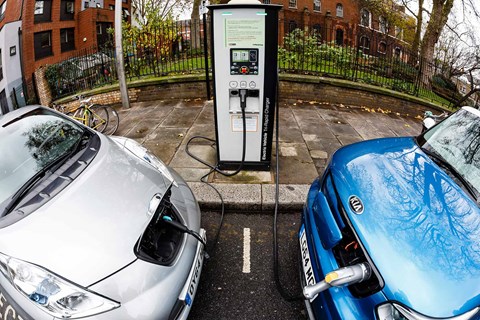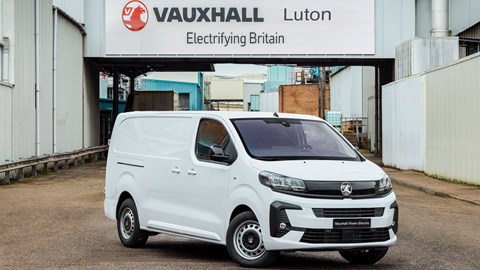► The UK government relaxes ZEV mandate
► Electric car quotas eased in response to tariffs
► Pure ICE models still banned from 2030 though
The government has relaxed details in the Zero Emission Vehicles (ZEV) mandate in response to US president Donald Trump’s swingeing tariffs on car makers – meaning that manufacturers have more leeway in the switchover to electric vehicles.
It means that car makers are less likely to face fines for non-compliance and there’s more wriggle room for them to balance the delivery of electric vehicles in different years to avoid fines. The fine for non-compliance is reduced from £15,000 to £12,000 and the government is pledging to invest £2.3 billion towards ‘tax breaks for people buying electric vehicles and improving charging infrastructure,’ according to prime minister Keir Starmer.
The key changes to the ZEV mandate announced overnight are:
- Rules relaxed on hitting EV targets
- Smaller fines for non-compliance
- Manufacturers allowed to juggle delivery years
- Extends the ability to transfer non-ZEVs to ZEVs from 2024-26, out to 2029
- Phase-out of new petrol and diesel car sales confirmed for 2030
- But sales of full hybrids allowed until 2035
- Extra flexibility for van to car transfer: so one car credit can be exchanged for 0.4 van credits, and one van credit can be exchanged for two car credits
- Low-volume manufacturers like Aston Martin and McLaren are exempt from mandate targets
Starmer added: ‘ Today I am announcing bold changes to the way we support our car industry. This will help ensure home-grown firms can export British cars built by British workers around the world and the industry can look forward with confidence, as well as back with pride. And it will boost growth that puts money in working people’s pockets, the first priority of our Plan for Change.’

The British government has watered down the ZEV mandate after a public consultation – and it comes just days after Trump imposed 25% tariffs on all cars sold in the US that are not made there.
The car industry responds to the new, softer ZEV mandate: April 2025
Mike Hawes, SMMT chief executive: ‘The government has rightly listened to industry and recognised the intense pressure manufacturers are under. Industry remains committed to decarbonising road transport but the ZEV mandate targets are incredibly challenging, especially with a paucity of consumer demand and geopolitical upheaval. Growing EV demand to the levels needed still requires equally bold fiscal incentives, however, to give motorists full confidence to switch. We await full details of the regulatory amendments but, given the potentially severe headwinds facing manufacturers following the introduction of US tariffs, greater action will almost certainly be needed to safeguard our industry’s competitiveness. UK-US negotiations must continue at pace, while the long-awaited industrial and trade strategies should prioritise automotive and be delivered at speed.’
Philip Nothard, chair at the Vehicle Remarketing Assocation: ‘The good news is that the government has listened and made material changes. There has been a general recognition that existing targets were proving unrealistic and a relaxation was needed that accounted for real world market conditions. Moves such as allowing hybrid cars and diesel vans to stay on sale until 2035 will provide a degree of breathing space for manufacturers, as will the greater flexibility around production caps and car and van credits. Notably, it does feel as though the particular difficulties the new electric van market is facing have been recognised. Overall, we’re giving these moves a cautious welcome.’
The UK’s ZEV mandate: a potted history
The mandate was introduced in 2024 and set a pathway to full electrification of all new car sales in the UK. The ZEV mandate was designed to increase incrementally each year, with a 22% target for 2024, rising to 28% in 2025.

The ramifications of the ZEV mandate are already being felt. It was cited by Stellantis as a reason for announcing the closure of the Luton van plant and by Ford for cutting 800 jobs in the UK.
Nissan is the latest in a long line of manufacturers calling for urgent support from the government. Guillaume Cartier, chairperson for the Nissan Africa, Middle East, India, Europe and Oceania (AMIEO) region, said ‘the Mandate risks undermining the business case for manufacturing cars in the UK, and the viability of thousands of jobs and billions of pounds in investment.’
What is a ZEV?
The criteria is simple, according to government definitions: a zero-emission vehicle (ZEV) produces 0g/km of CO2 and has at least 120 miles of range, according to the WLTP test cycle.
So that broadly means EVs, as they make up most of the market here, but hydrogen fuel cell vehicles like the Hyundai Nexo also count.